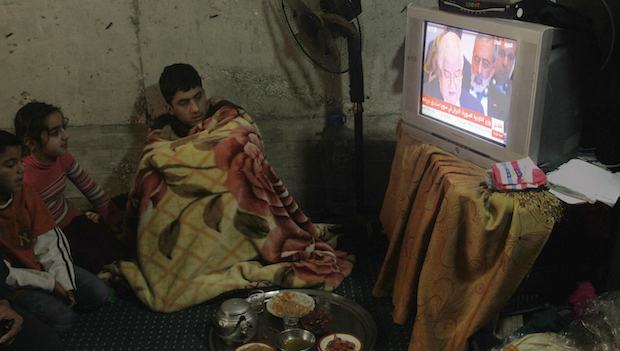
Syrian refugees watch the Geneva II peace conference on television in the port city of Sidon, southern Lebanon, on January 22, 2014. (REUTERS/Ali Hashisho)
Beirut, Asharq Al-Awsat—Before the Syrian crisis started, Asma’s family eked out a living farming in Deir Ezzor, eastern Syria. But when several of her family members were killed in an airstrike as the security situation in her country deteriorated, Asma, her husband and their four children decided to flee into Lebanon.
With the help of Syrian rebels, the family of six managed to cross the border, first stopping in the town of Arsal and then moving on to Beirut, the Lebanese capital. In Beirut, Asma and her family live in one room, which they use for everything: living, sleeping, cooking, washing, and so on. In the middle of the room is a TV they always keep tuned to news of the conflict.
The speeches delivered by Syrian government and opposition leaders at the Geneva conference were on that television when Asharq Al-Awsat visited Asma and her family at home this week. Asma derided their speeches: “The leaders of the nations are meeting in order to trade martyrs’ blood.”
“The issue of refugees will be the focus of their attention only [when speaking] to the media, while in fact the money and aid will go right into their pockets,” she said.
“I came to Lebanon two years ago and I submitted my papers to the UN in order to get aid, but I have not received anything so far,” Asma said bitterly. “Where is the money being spent in the name of the Syrian refugees in Lebanon? Where is the aid all those national leaders pledge when they speak to the press?”
Asma works as a maid, and her husband, who is in his 30s, works as a builder by day and as a garbage man at night, but they are still living in desperate conditions. Asma says: “We live off one small meal a day . . . If we feel hungry after, we have water and leftover bread. When our kids get sick, we beg for money to buy medication.”
“A Syrian refugee is fated to live in humiliation because of the president [Bashar Al-Assad] who wanted to rule his people through a dictatorial, oppressive regime that has no mercy even for its own people, let alone strangers,” she added.
Despite her suffering and the daily burden of supporting her family, Asma still has some hope that the Geneva II conference will improve living conditions for the Syrians the war has scattered across the region.
When asked when she and her family expect to return to Syria, Asma said: “It is impossible. How do they expect us to return to Syria, if there is even a Syria still there?”
“Syria has become a pile of rubble littered with dead bodies and blood,” she said. It ended the conversation.
Another Syrian refugee in Lebanon, Ruqaya, is no better off. The mother of five came to Lebanon with her family to escape the harsh humanitarian conditions in Homs in the early months of the government siege.
Ruqaya, whose thin face reflects how tired she is, says: “We came to Lebanon to escape the ruthless military killing machine, but found ourselves dogged by poverty and hunger instead.”
Ruqaya and her family live in a poor neighborhood in the Lebanese capital. Ruqaya’s husband, who rents the tiny room they live in for 400 US dollars a month, spends his day standing in Mar Mkhail, a Beirut district where foreign workers wait for potential employers to take them on for casual manual work.
As she uses plastic bags to diaper her baby, Ruqaya speaks bitterly of the peace talks going on a world away in Switzerland: “Our president shed our blood, destroyed our houses and wrecked our business. How can we trust strangers who have ambitions in Syria?”
For Ruqaya, Geneva II will “neither achieve ceasefire nor rebuild what remains of our beloved country.”
“They are plotting against us, and they will impose upon us a future they shaped,” she said, adding, “The opposition is not as it used to be, and if it remains in power the regime will not change.”
Ruqaya’s neighbor, Um Ali, another Syrian refugee, interrupts her: “I do not know who in the opposition represents us in Geneva, nor do I know the names of the members and negotiators of the Syrian regime’s delegation. All I know is that there are children in Homs who need food, and others who need houses in Aleppo and other besieged areas.”
